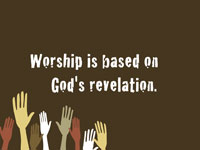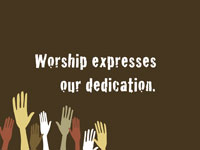



 Top Ten Indications That Your Worship Service Might Be a Bit Too Relaxed:
Top Ten Indications That Your Worship Service Might Be a Bit Too Relaxed:
Worship and the ability to interact with God is an incredible privilege and responsibility.
Worship comes from two words that really mean “worth” and “ship.” The meaning of worship is to give worth back to God. In worship we assign Him His true and proper place.
Worship is the proper recognition and celebration of God, returning to Him the glory or honor that He deserves.
“Professional football players have said that their performance on Sunday is a reflection of how they’ve practiced all week. Let me suggest to you that with worship it’s precisely the opposite. We live during the week as a reflection of how we are worshipping—on Sunday or any other day.
Worship is actually something like the State of the Union address for your life. It says how you feel about God at this moment in time, and it paves the way for how you will go on to live as a result. We approach God in a way that reflects the state of our present life.” (Jeremiah, My Hearts Desire, pg.56-57)
Charles Stanley once said that he believed that most Christians in most churches have never worshiped God.
There are some questions must be asked today:
Do you worship God?
Do you know how to worship God?
Do you experience God when you come in to this room on Sunday morning or do you just enjoy the music and the sermon and go home feeling a little better than when you came in?
I am afraid that we often go to church, but we don’t worship.
We sing songs, but we don’t worship.
We listen to sermons, but we don’t worship. All of these things are elements of worship but they are not worship in and of themselves which means that you can do all of them and yet have failed to truly worship God.
True worship is not interested in the created but the Creator. Question’s like “Did I like the sermon/service/music?” are the wrong kind of questions. The right question is “Did God like it?”
Christians also make the mistake of limiting their worship to one hour each week. And when they come to that service they often come to observe and be entertained.
I have been at services that were opened with the following statement: “We want you to sit back, relax, and enjoy the program we have prepared for you.” If the people feel that they were entertained they say they had a good worship service. We have gotten the whole concept of worship backwards. We think that the pastor and worship leaders are the entertainers and we are the audience. But in true worship we are the performers, the pastors and worship leaders are the directors, and God is the audience. Because our concept of worship is backwards we want to know what’s in it for us. If we are going to truly worship, we must come to the realization that worship is not for us, but for God. Because God desires our worship, we must learn how to worship him.
Worship isn’t a spectator sport, but a contact sport. Every one of us is to come in contact with the Spirit of God.
The word ‘worship’ appears in the Bible for the first time in Genesis 22:5.
Watch this scripture on the screen as I read this story to you during the sermon.
Abraham’s story leaves us with an insight into some of the important elements of worship. Worship doesn’t just happen. It is a deliberate action. Worship is not about music. It is what we do with our lives. Here is the story of a true worshipper of God.  1. Worship is based on God’s revelation.
1. Worship is based on God’s revelation.
“After all this, God tested Abraham. God said, “Abraham!” “Yes?” answered Abraham. “I’m listening.” He said, “Take your dear son Isaac whom you love and go to the land of Moriah. Sacrifice him there as a burnt offering on one of the mountains that I’ll point out to you.”
The worship that takes place in this story is centered on God revealing Himself to Abraham and speaking to him. Worship is based on God revealing Himself to people like you and me.
True worship is based on the revelation of God. Worship is not based on my likes or dislikes. It is not based on my personal preferences or priorities. It is based solely on God’s revelation of Himself as it is found in the scriptures.
Because true worship is based on the Bible the only question that needs to be asked of our means of worship is -- Are they biblical? The music must be biblical. The sermon must be biblical. The prayers must be biblical.
You and I will really worship when we have been living in a place where God can reveal himself to us. He must be more than a Sunday morning God.
When you live in His presence everyday and practice the presence of God everyday.
When you allow God to weave His presence into the everyday fabric of your life, you will have no trouble worshipping.
Our worship will be based on our revelation of God. In this story God revealed Himself to Abraham. He called Him by name.
Have you heard Him call your name?
Do you have a clear vision of the God of this Bible?
Why is it so vitally important that our worship be biblical? Allow me to answer that question with a story. James Michener, writing in his book, The Source, tells the story of a man named Urbaal, who was a farmer living about 2200 B.C. He worshiped two gods, one a god of death, the other a goddess of fertility. One day, the temple priests tell Urbaal to bring his young son to the temple for sacrifice -- if he wants good crops. Urbaal obeys, and on the appointed day drags his wife and boy to the scene of the boy’s “religious execution” by fire to the god of death. After the sacrifice of Urbaal’s boy and several others, the priests announce that one of the fathers will spend next week in the temple, with a new temple prostitute. Urbaal’s wife is stunned as she notices a desire written more intensely across his face than she had seen before, and she is overwhelmed to see him eagerly lunge forward when his name is called. The ceremony over, she walks out of the temple with her head swimming, concluding that “if he had different gods, he would have been a different man.” (Erwin Lutzer, Pastor to Pastor, p. 89)
Because the kind of God you worship is the kind of person you will become, we must make sure that the God we worship is the God of the Bible and not a god of our own making.  2. Worship includes intentional preparation.
2. Worship includes intentional preparation.
“Abraham got up early in the morning and saddled his donkey. He took two of his young servants and his son Isaac. He had split wood for the burnt offering. He set out for the place God had directed him.”
The revelation that Abraham received from God was hard to hear but Abraham made preparations to obey immediately. He got his servants together, cut the wood for the burnt offering, saddled his donkey, and took his son and set out.
Just like Abraham we need to make the appropriate preparations in order to worship God. If we have not prepared our hearts to worship God we will not be able to worship even if the worship service is biblical.
When football players prepare for a game they do what they call ‘getting their game face on’. That means that they prepare themselves mentally for the challenges of the game they are about to play. Spiritually speaking we need to ‘get our game faces on’ before we go to church.
Deeply immersed in meditation during a church service, Italian poet Dante Alighieri failed to kneel at the appropriate moment. His enemies hurried to the bishop and demanded that Dante be punished for his sacrilege. Dante defended himself by saying, “If those who accuse me had had their eyes and minds on God, as I had, they too would have failed to notice events around them, and they most certainly would not have noticed what I was doing. (Today in the Word, March 10, 1993)
Like Dante we need to get our eyes and minds on God because we cannot go from the secular to the sacred in a moment.
We cannot pass from the world to worship at the drop of a hat.
We prepare for work. Shouldn’t we prepare for worship? When you think about it we spend time preparing for almost everything in life. We spend time preparing for work, for vacations, for school, for exams, for meals, and we even take time to prepare for bed.
But very few of us take time to prepare ourselves for worship. We may prepare to go to church. But that isn’t the same as preparing for worship. We prepare for church by getting dressed in our Sunday best, fixing our hair and make up, and grabbing our Bibles as we head out the door. The typical Christian is very well prepared for church but not at all prepared for worship. Abraham prepared to worship God by being obedient to the revelation of God.  3. Worship is a solo act and that takes separation.
3. Worship is a solo act and that takes separation.
“On the third day he looked up and saw the place in the distance. Abraham told his two young servants, “Stay here with the donkey. The boy and I are going over there to worship; then we’ll come back to you.”
At a certain point in the journey Abraham left his servants behind.
It is very possible that they would have interfered when they realized that he was going to sacrifice his son and Abraham wasn’t about to allow anything to distract him from worshiping. We need to separate ourselves from anything that would draw our attention away from God. I’m not even talking about sinful things. I’m talking about the natural and normal things of life.
Things like work, family, and finances can all distract us from the worship of God.
These are not things that we can simple eliminate from our lives. But we do need to put them out of our minds so that we can be free to focus on God. We can even allow the elements of the worship service itself to distract us from worship. You must not allow the preacher, the music, the praise team, the ushers, or the people around you to distract you from worshiping your God.
We are called to offer a sacrifice of praise. We are called to forget about ourselves and our comfort zones, and worship God with all our being.
This gets us right down to the basics of worship.
We call our Sunday and Saturday night services celebrations. Why do we do that? We do it because when you gather together with others our focus is celebrating what God has done in our lives. We come together to sing and speak and remember what God has been, what He is today and what we believe that He will be tomorrow.
Real worship connects you to God and forces you to face yourself before a Holy and Righteous God.
It is just you and Him. To worship you have to be in love with Jesus. Not some song. Not some preacher or church. It’s all about Him. Look at the context of this story. This is the first mention of the word worship in the Bible. This is a tough act. Listen to Abraham as he obeys the revelation God has given him.
“The boy and I are going over there to worship. . .”
Abraham is prepared to give all. It’s an all out commitment—complete dedication.
There is no way for us to be half-crucified with Christ. There’s no way to pick up half the cross and follow Him.
True worship is true sacrifice. You do what you have to do to worship God.
In a church that understands worship the front seats are the first to be taken.
During the tenure of the great orator Henry Ward Beecher, a visiting minister (Beecher’s brother) once substituted for the popular pastor. A large audience had already assembled to hear Beecher, and when the substitute pastor stepped into the pulpit, several disappointed listeners began to move toward the exits. That’s when the minister stood and said loudly, “All who have come here today to worship Henry Ward Beecher may now withdraw from the church. All who have come to worship God keep your seats!” (Today in the Word, April 1989, p. 22) We have not come together this morning to worship the preacher, the music, the singers, or the instruments, or the music style, but God and God alone.  4. Worship expresses our dedication.
4. Worship expresses our dedication.
“Abraham took the wood for the burnt offering and gave it to Isaac his son to carry. He carried the flint and the knife. The two of them went off together.
Isaac said to Abraham his father, “Father?” “Yes, my son.” “We have flint and wood, but where’s the sheep for the burnt offering?”
Abraham said, “Son, God will see to it that there’s a sheep for the burnt offering.” And they kept on walking together.
They arrived at the place to which God had directed him. Abraham built an altar. He laid out the wood. Then he tied up Isaac and laid him on the wood. Abraham reached out and took the knife to kill his son.”
Abraham dedicated his son Isaac to God. It wasn’t like he had twelve sons. Isaac was his only son. Isaac was the son God had promised to him years earlier. Isaac was the son that was to carry on the family line and grow into a great nation. Abraham also dedicated himself completely to God. As Abraham stood holding the knife above his head ready to plunge it into his son he was completely dead to self. He had dedicated all he was and all he had to God.
True worship is always costly. True worship always requires us to give up our best for God’s best. Oswald Chambers said it this way: “my utmost for His Highest.”
Bertoldo de Giovanni is a name even the most enthusiastic lover of art is unlikely to recognize. He was the pupil of Donatello, the greatest sculptor of his time, and he was the teacher of Michelangelo, the greatest sculptor of all time. Michelangelo was only 14 years old when he came to Bertoldo, but it was already obvious that he was enormously gifted. Bertoldo was wise enough to realize that gifted people are often tempted to coast rather than grow, and therefore he kept trying to pressure his young prodigy to work seriously at his art. One day he came into the studio to find Michelangelo toying with a piece of sculpture far beneath his abilities. Bertoldo grabbed a hammer, stomped across the room, and smashed the work into tiny pieces, shouting this unforgettable message, “Michelangelo, talent is cheap; dedication is costly!” (Gary Inrig, A Call to Excellence)
Let’s covenant together to not offer anything to God that is less than 100% dedication to God.  5. Worship is an unashamed proclamation of God’s nature and work.
5. Worship is an unashamed proclamation of God’s nature and work.
“Just then an angel of God called to him out of Heaven, “Abraham! Abraham!” “Yes, I’m listening.” “Don’t lay a hand on that boy! Don’t touch him! Now I know how fearlessly you fear God; you didn’t hesitate to place your son, your dear son, on the altar for me.”
Abraham looked up. He saw a ram caught by its horns in the thicket. Abraham took the ram and sacrificed it as a burnt offering instead of his son. Abraham named that place God-Yireh (God-Sees-to-It). That’s where we get the saying, “On the mountain of God, he sees to it.”
Abraham called that place “The Lord Will Provide” -- Jehovah Jireh. By doing so he was proclaiming the nature and work of God. He was declaring who God is and what God does. That is praise and worship. Praise is proclaiming what God has done. Worship is proclaiming who God is.
She lived in the city of London, on the top floor of a tenement building. She had brought her share of great dreams to the great city. But what happened was beyond the wildest of them.
The building she lived in caught fire and she was caught on the top floor. As the fire raged out of control this terrified young lady was spotted in an open window, weeping and pleading for help. Every door and every escape route was cut off by flames. To those looking on it seemed she only had moments to live.
Suddenly a ladder shot into the sky. It came to rest against her window, and a courageous fireman took the young lady into is arms and carried her downward to safety. Just seconds later the roof collapsed.
The scene was chaotic commotion. Neighbors were laughing and crying, people rushed the exhausted young lady to a hospital and in no time the fireman had seemingly vanished. She’d never even said thank-you.
During the next few days she called the London Fire Department, talked to a few of the men and discovered the name and address of the lifesaver. Over the phone she genuinely expressed her gratitude. The two begin to chat and a friendship developed. Neither had any romantic attachments and where one fire had been put out a new one began to come to life. Friendship grew into love and than marriage. For the rest of her life she would tell her friends how she could never forget how her husband had saved her life.
Rescue and Romance are two separate worlds. The fireman had become more than a lifesaver; he had become the object of adoration.
I think the problem most of us have is that we have never made the “phone call”—the one where we seek to discover more about the One who saved us.
David Jeremiah says, “Many of us have a vague awareness that we’ve avoided hellfire, but we don’t feel any particular emotional attachment to our Rescuer. Oh we give Him a call every now and then whenever we need another rescue.” Some of us have become proficient at 911 calls to God.
It’s time to take the step from salvation to adoration.
THE RESULTS OF TRUE WORSHIP:
“The angel of God spoke from Heaven a second time to Abraham: “I swear—God’s sure word!—because you have gone through with this, and have not refused to give me your son, your dear, dear son, I’ll bless you—oh, how I’ll bless you! And I’ll make sure that your children flourish—like stars in the sky! like sand on the beaches! And your descendants will defeat their enemies. All nations on Earth will find themselves blessed through your descendants because you obeyed me.”
Then Abraham went back to his young servants. They got things together and returned to Beersheba. Abraham settled down in Beersheba.” The Message
"God does not need our worship But we need to worship God Our humanness depends on it. Not to worship God is to deny our essential humanity. It is of the very essence of authentic humanness to worship God. Made to worship, man becomes something less than human when he refuses to worship. It is not God who suffers when we do not worship it is we who suffer" -- Richard C. Halverson
Ralph Waldo Emerson hit the nail on the head when he said:
THE GODS we worship write their names on our faces, be sure of that. And a man will worship something —have no doubt about that, either. He may think that his tribute is paid in secret in the dark recesses of his heart—but it will out. That which dominates will determine his life and character. Therefore, it behooves us to be careful what we worship, for what we are worshipping we are becoming.
One of my favorite author’s Annie Dillard warns us with these words: “On the whole, I do not find Christians, outside of the catacombs, sufficiently sensible of conditions. Does anyone have the foggiest idea what sort of power we so blithely invoke? Or, as I suspect, does no one believe a word of it? The churches are children playing on the floor with their chemistry sets, making up a batch of TNT to kill a Sunday morning. It is madness to wear ladies hats and straw hats and velvet hats to church; we should all be wearing crash helmets. Ushers should issue life preservers and signal flares; they should lash us to our pews. For the sleeping god may wake someday and take offence, or the waking god may draw us out to where we can never return.”
Let’s stand and finish the music part of our worship today. . .
This sermon was based thoughts from a sermon written by Steven Dow who pastors the Heritage Wesleyan church. Many thoughts were also gleaned from the book, My Heart’s Desire, written by David Jeremiah.